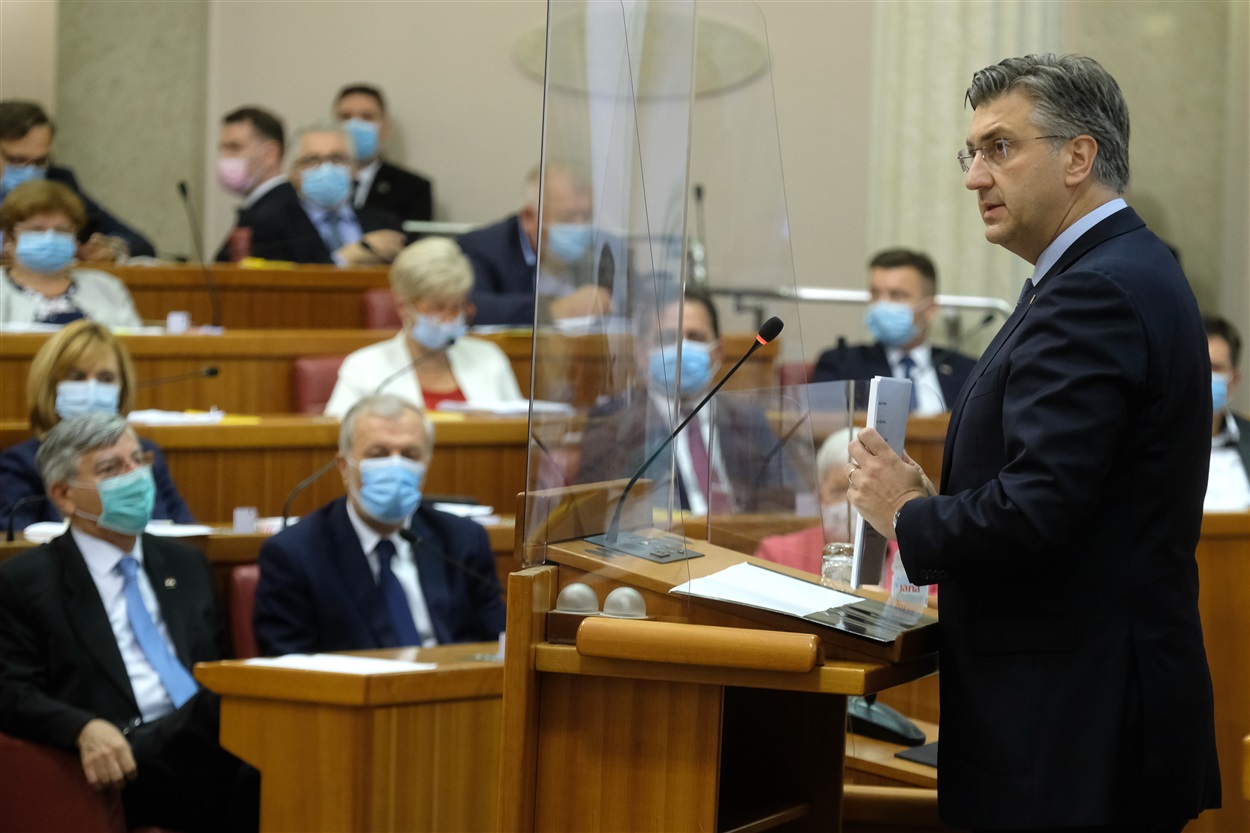
Zagreb - Prime Minister Andrej Plenković on Wednesday reported to the Croatian Parliament on the recent EU summit at which Croatia was granted access to €22 billion over the next seven years, which he said was a strong lever for economic recovery.
Plenković reported on the results of the marathon summit of EU leaders that ended on July 21 with an agreement on the post-pandemic recovery plan and seven-year budget, after which Foreign Minister Gordan Grlić Radman presented the results of the Croatian Presidency of the Council of the European Union in the first half of the year.
"Never before has the government presented to parliament a report of such great financial importance and with such far-reaching consequences for our economic development, our social cohesion, for the progress of Croatia and the entire European project," Plenković said.
Of the €1.824 trillion agreed at the summit, Croatia will have access to €22 billion, which is HRK 165 billion over the next four, i.e. seven years, he said. "That is double the amount that was made available to us in the Multiannual Finance Framework for the past 2014-2020 period," he added.
He said that this is one of the largest amounts per capita "which will ensure that for each euro invested we get more than 4.5 euros from the EU budget."
"For Croatia, for its citizens and economy, we have ensured a strong lever for economic development over the next four, that is seven years," Plenković said, stressing that in this way his government had defended Croatian interests.
He said that Croatia had shown that "it is a strong state that protects its national interests, utilises its strength for the benefit of its citizens and its economy, improving its international standing through EU membership."
"Croatian citizens have seen this, they understand it and recognise it better than those who missed out on this topic 30 years ago," the prime minister said.
Financial package
The EU financial package is based on two strategically designed and related pillars: the 2021-2027 Multiannual Financial Framework and the recovery plan called Next Generation EU.
Plenković said that Croatia had wanted the agreement to be reached because "the political responsibility of EU leaders at this point is of paramount importance." He said that Croatia had managed to ensure that the other EU member states took into account the specific position of Croatia which has so far used only one seven-year budget.
"We managed to achieve several objectives on which we had been working for months," the PM said, adding that Croatia managed to keep the national co-financing rate for cohesion and rural development at 15%, and not at 25%.
"At the same time we advocated that the rule on automatic decommitment of cohesion funds three years after their allocation, the so-called N+3 rule, should remain in place. The idea initially was that it should be N+2, but at this stage N+3 still suits us and we managed to keep it," Plenković said.
This gives Croatian beneficiaries a longer, three-year period to use budget funds and reduces the risk of loss and paying the money back into the EU treasury, he added.
In the next seven-year EU budget, Croatia will be have access to €12.7 billion in three envelopes: €7.5 billion for cohesion, €2.5 billion for direct payments for agriculture and €2 billion for rural development. Added to this should also be funding from different EU instruments: €270 million for fisheries, €250 million for internal security and migration, as well as funding for a fair and just green transition, research, health, education, transport and digital infrastructure.
Plenković said that Croatia had also managed to present to the European Union to what extent the COVID-19 pandemic had affected its tourism and other economic sectors. In this context, he also mentioned the March 22 earthquake that struck Zagreb and its environs, causing extensive damage.
Plenković said that Croatia had also highlighted the specific economic and demographic situation in eight of its counties that make up the Pannonian Croatia region.
"In addition to this 400 million, we also insisted on and were granted 100 million euros as aid for rural development because of specific structural challenges faced by the agricultural sector," he said and added that these arguments were part of efforts to reduce the negative demographic trends and keep young people in rural areas and in the agricultural sector.
Croatia also managed to ensure an advance of 10% of grants from the Recovery and Resilience Facility which will be paid out in 2021. These nearly 600 million euros will ease the burden on the state budget, the Prime Minister said.
This is important for the sake of macroeconomic stability, particularly in the light of the recent accession of Croatia to Exchange Rate Mechanism 2, a sort of waiting room membership of for the euro area.
In order for member states to obtain EU funding, they must draw up national plans in compliance with the the objectives of the EU's digital and green transition.
"A positive evaluation for disbursement of funds will be tied to the fulfilment of the relevant criteria" from plans which will be approved by the European Commission and the Council, Plenković said.
Croatia will prepare its plan by the end of the year and present it to Parliament. On Thursday, the government will set up a special task force to solely deal with this matter, Plenkovic said, adding that he personally will chair this coordinating body.